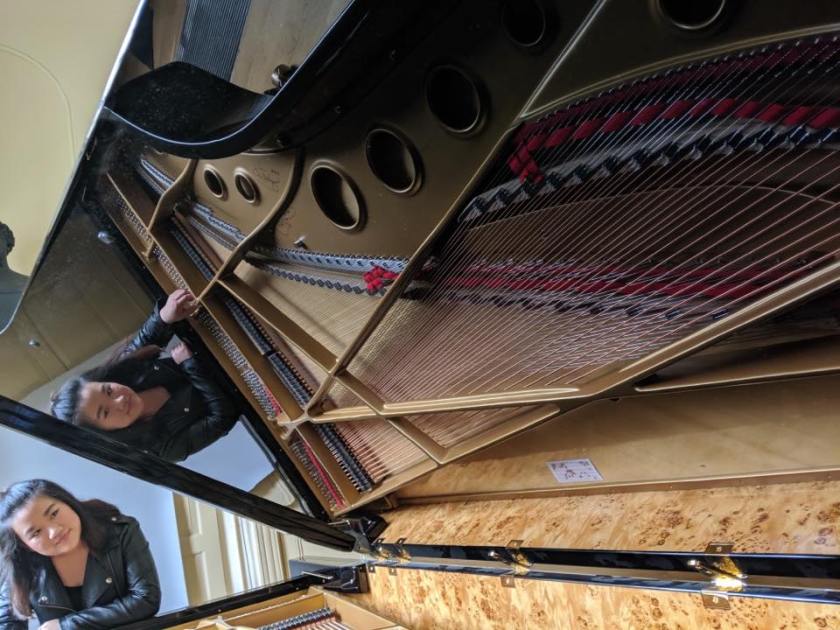Who or what inspired you to pursue a career in music and who or what have been the most important influences on your musical life and career?
I was eleven years old when I expressed my desire to become a pianist. I had recently changed teachers to the person who would become my most important musical influence in my adolescence, Lana Forman, who encouraged me to ‘hear’ the expressive potential in the music I played. It was eye-opening: I felt like I had stumbled upon a radiant world to which I had been oblivious up until that point, and I have not been able to look away since.
The professors with whom I studied in my post-secondary education have been instrumental in shaping my present musical identity. My undergraduate professor, Leslie De’Ath, nurtured my passion for contemporary music by encouraging my exploration of challenging repertoire and frequently introducing me to new scores. Douglas Finch, with whom I am currently studying, has been unrelentingly supportive in my work on Michael Finnissy’s ‘The History of Photography in Sound’, and has done much for me in terms of building my confidence, technique, and interpretative ability in performing a variety of contemporary piano works.
Lastly, Michael Finnissy’s music and thought has had significant impact on me, being a composer and intellectual whom I greatly admire.
What have been the greatest challenges of your career so far?
My greatest musical undertaking is my performance of Michael Finnissy’s ‘The History of Photography in Sound’ (1995-2001), a work for piano comprising of eleven sections and lasting five-and-a-half hours in total. I had the privilege of being coached by him over the course of a year, culminating in a performance of the complete work at Trinity Laban’s New Lights Festival in June 2019. The experience has been one of the most challenging, and most rewarding, of my musical journey, requiring the development of formidable mental and physical fortitude, perseverance, resilience and commitment in everyday practice, in the months leading up to, and in the moment of performance. The process involved constantly pushing myself beyond what I thought to be possible.
The lessons and insights I gained into making music during this time are just as significant as the ‘outcome’. I would say that the most important one, for me, is listening: intentional, active listening, to and beyond what is on the page. Trying to get in touch with the sound world and thoughts behind the notation instead of considering the music only as ink on paper. Michael’s writing holds an extraordinary range of expressive nuance and color, in both sound and silence: I am learning to listen to both.
Which particular works do you think you perform best?
I’m happy for you to be the judge of that.
What do you do off stage that provides inspiration on stage?
Nothing provides inspiration more effectively for me than a good rest before a performance.
Do you have a favourite concert venue to perform in and why?
I have really enjoyed my performances in Trinity Laban’s Peacock Room – I am quite partial to the Fazioli there!
What do you feel needs to be done to grow classical music audiences/listeners?
I don’t know much about the best ways to fill more seats in concert halls. However, I do believe in the power of music education, as my own appreciation of classical music was developed during my studies. Lessons should prioritize fostering a genuine love of the repertoire above getting ‘results’ in terms of conservatory exams. I have grown up with kids for whom music became nothing but a chore, a subject of daily arguments with pushy parents who want them to complete x number of levels in the conservatory. In the end, they reaped minimal benefits from lessons, which had become entangled with negative associations.
I think that children who are encouraged to be creative, and allowed to develop their own interpretation and thoughts will ultimately retain their love of music into adulthood.
As a musician, what is your definition of success?
That moment in performance when I manage to ‘connect.’
What do you consider to be the most important ideas and concepts to impart to aspiring musicians?
Nurturing an organic connection to music. That has been something which has kept me going in my most difficult of times.
Where would you like to be in 10 years’ time?
Still prioritizing what is important to me, I should hope – not sacrificing my values or convictions in order to take it easy. As for what I’ll be doing, I’m excited to find out! Maybe performing with one (or a few) robotic arms? Sample underwater volcanoes? Trying performance art on Mars? Actually, a combination of all of the above sounds fun….
What is your idea of perfect happiness?
Flying towards the sun, even as my wax wings melt.
Fifth Political Agenda, a new piece by Michael Finnissy written especially for Annie Li, receives its premiere on Thursday 10 July at Trinity’s Preludes to New Lights Festival 2021, a digital festival of composed and improvised contemporary piano and keyboard music performed and recorded in lockdown. Details of the full programme of events here
Pianist Annie Li is a post-graduate student at London’s Trinity-Laban Conservatoire of Music and Dance, studying with Douglas Finch.
Photo by Mahsa Salali
